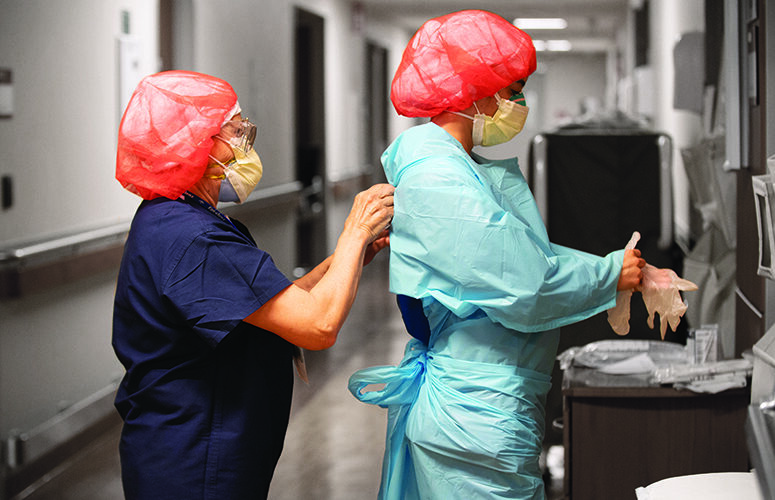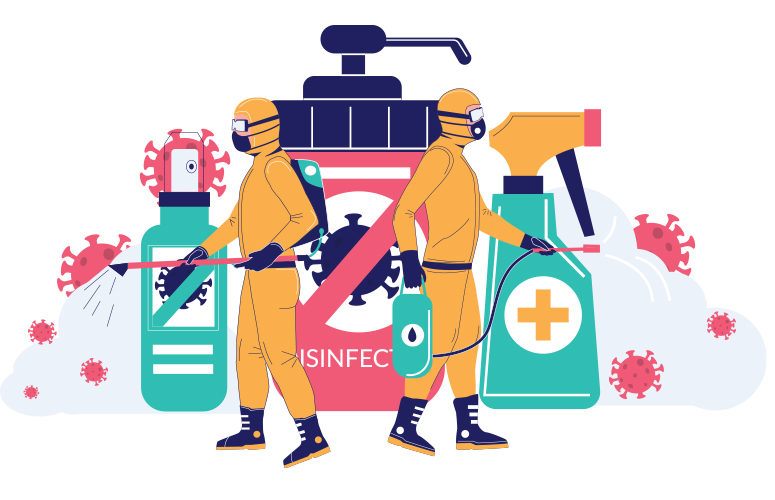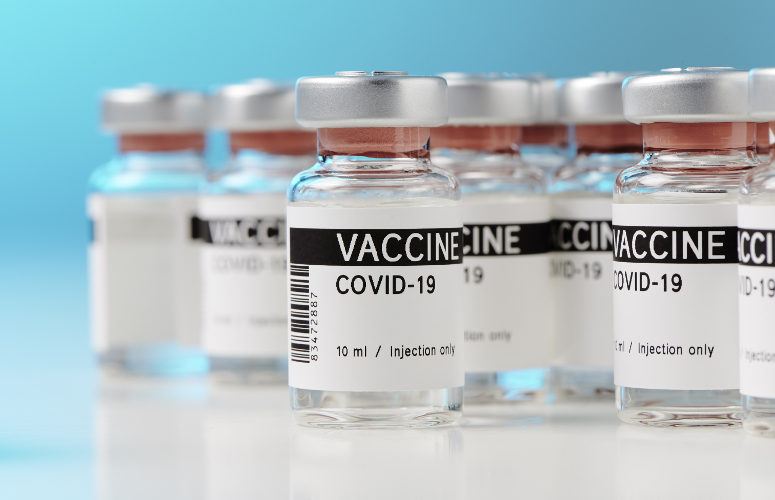
Award-Winning Hospitals Deliver Quality Care
THE MYRIAD AWARDS AMONG NEW JERSEY’S 113 HOSPITALS HELP CEMENT A REPUTATION FOR HEALTHCARE EXCELLENCE AND INNOVATION THROUGHOUT THE GARDEN STATE.
By Ron Marsico, Contributing Writer On Feb 2, 2022Amid the world’s greatest health crisis in a century, New Jersey’s hospitals are distinguishing themselves again with an array of state and national excellence awards for patient care and services across the illness spectrum.
Recognition amplifies the success of various procedures and protocols for a myriad of illnesses, fostering awareness and confidence among prospective patients, while boosting hospital staff morale – especially during the unprecedented challenges faced during the pandemic.
Among the bevy of honors in 2021, Hackensack University Medical Center’s (HUMC) mitral valve reconstruction program was recognized for “superior clinical outcomes’’ by the American Heart Association and the Mitral Foundation. Using heart patients’ own tissue for the valve repairs, rather than replacing the valve, reduces complications and lengthens lives, proponents say.
Englewood Health was nationally acknowledged as a Top Teaching Hospital by healthcare watchdog, The Leapfrog Group, following an earlier Leapfrog award of an “A’’ Hospital Safety Grade. Englewood also earned its fifth Magnet Recognition Program award for nursing excellence.
Saint Peter’s University Hospital’s Endoscopy Unit was honored for its “commitment to patient safety and quality’’ by the American Society for Gastrointestinal Endoscopy. The hospital also garnered Leapfrog’s “A” Hospital Safety Grade and U.S. News & World Report recognized its neonatal intensive care unit for stellar achievement.
“We take a lot of pride in trying to be innovative and progressive and trying new techniques,’’ says Dr. Mark Anderson, interim chair of HUMC’s department of cardiac surgery and a cardiothoracic surgeon, explaining the overall importance of such awards. “This reinforces to our team that what we’re doing is worth it, it’s worthwhile for our patients.”
As February marks American Heart Month, team-based awards like the one for HUMC’s mitral valve reconstruction program are especially gratifying, Anderson says.
More than 150,000 people are employed by New Jersey hospitals, making it the state’s largest private sector employer, while providing care to more than 15 million patients annually, according to the New Jersey Hospital Association (NJHA). Coupled with the state’s large pharmaceutical industry (dubbed by some as “The Medicine Chest of the World”), healthcare and related services and products dominate New Jersey’s economic landscape.
Thirty of New Jersey’s hospitals – more than a quarter – received “A” Hospital Safety Grades from Leapfrog. Why is this so important? Leapfrog estimates as many as 400,000 people die each year due to preventable medical errors.
“We’ve always stayed focused, despite the pandemic, that we were going to continue to do what we need to do from a patient safety perspective,’’ says Linda Carroll, Saint Peter’s vice president of patient care services and chief nursing officer.
“People – especially now with the pandemic – are concerned about hospital environments and making sure that they’re safe,’’ she says.
Dr. Arkady Broder, chief of Saint Peter’s division of gastroenterology and hepatology, says his unit’s award shows a “commitment for the highest and most stringent level of quality for endoscopy,’’ which includes colonoscopy exams.
One overlooked aspect of the COVID-19 pandemic, Broder says, is that from an elective care standpoint, patients have missed out on thousands of preventative exams.
“Now that we’re back and open, I think the message needs to be: ‘Come out and get tested, get screened appropriately,’’’ he says.
(Editor’s Note: Broder and others in this article were interviewed in mid-December, when COVID-19’s Omicron variant cases were yet to spike. At press-time, a number of hospitals in the state are limiting or banning elective surgeries).
Broder says endoscopies can seek out potential damage from acid reflux to avert a pre-cancerous change in the esophagus or seek the cause of other pain.
Colonoscopies are critical to finding polyps, which can be precursors to cancer, and removing them, Broder says.
Individuals also should be aware of recent changes in colonoscopy guidelines, Broder explains, including a recommendation of having the first exam now at age 45 – up from age 50 previously. He adds that, depending on the number and subtypes of polyps found, patients will need another exam in three, five, or 7-10 years.
The doctor notes his favorite quote for the importance of such exams is: “The most effective colon screening exam is the one that gets done.”
NJHA, meanwhile, is balancing recognition for COVID-19 healthcare with highlighting the need for patients to seek care for other illnesses, emphasizing the safety precautions its members have taken.
In July, NJHA “honored the compassion, leadership and heroics of its members during this pandemic year’’ with a new awards event. Fourteen individuals and organizations were recognized for “exemplary service’’ to New Jersey residents during the pandemic.
“With a novel virus, you learn on the move,’’ says NJHA President and CEO Cathy Bennett in an awards statement. “We did what we always do in healthcare; we faced the challenge head on. … We saw that spirit of self-sacrifice time and time again throughout the pandemic.’’
NJHA also is pushing to highlight the regrettable trend during the pandemic of rising at-home deaths, with the top three causes being heart, cancer and diabetes illnesses. Increasing at-home deaths during the pandemic’s first year, along with declining hospitalizations for non-COVID-19 serious health issues, indicates that delay in seeking care is costing lives.
Sean Hopkins, senior vice president of NJHA’s Center for Health, Analytics, Research and Transformation, says in a statement, “The trends are troubling, and they reinforce a critical message during a public health emergency: Please don’t delay in seeking the care you need.’’
Numerous other New Jersey hospitals, meanwhile, also are winning high-level awards and recognitions for their protocols, procedures and patient care services.
Englewood Hospital had another stellar year in 2021, being named by Leapfrog as a Top Teaching Hospital – one of only 72 hospitals nationwide to gain that distinction out of 2,200 candidates.
Additionally, Englewood earned Leapfrog’s “A” Hospital Safety Grade and won another nursing excellence award in 2021 from the Magnet Recognition Program.
“Any time that you receive a national recognition, it validates for the team … that it has been successful in meeting the needs of the patients from a safety, quality and patient experience,” says Kathleen Kaminsky, Englewood Hospital’s senior vice president of patient care services and chief nursing officer.
The hospital is coming off a major special Leapfrog award in 2020, being named the ‘Pandemic Hero of the Year’ in the team category, cited for its “rigorous commitment to keeping the community fully in the loop to educate and reduce fears” amid the crisis.
“It was overwhelming,’’ Kaminsky recalls. “It was just a positive reinforcement to the hard work of every single person in this organization – from the facilities’ team to doctors, the front-line nurses … everybody who was redeployed during COVID. It lifted the whole organization.”
Valley Hospital and Valley Health System achieved various 2021 distinctions and awards, including Newsweek’s ranking among the World’s Best Hospitals, designation as New Jersey’s third best hospital by U.S. News & World Report, Leapfrog’s “A” Hospital Safety Grade, as well as the LGBTQ Equality Leader Award.
“These recognitions reflect the high quality of the overall care provided at Valley, as well as our team’s skill and expertise in several clinical areas,’’ says Audrey Meyers, president and CEO of Valley Hospital and the Valley Health System.
A trio of Atlantic Health System hospitals won Leapfrog awards in 2021. Morristown Medical Center and Overlook Medical Center won Top Teaching Hospital honors, while Chilton Medical Center was designated a Top General Hospital.
RWJBarnabas Health was named in 2021 for the second straight year to Forbes’ List of America’s Best-In-State Employers.
“As New Jersey’s largest private employer – with more than 35,000 employees, 9,000 physicians and 1,000 residents and interns, inclusion on the list for a second consecutive year is confirmation of our commitment to providing a supportive and inclusive working environment for all our employees, especially during the ongoing challenges of the COVID-19 pandemic,’’ says Barry Ostrowsky, RWJBarnabas’ president and CEO.
All RWJBarnabas facilities also earned the College of Healthcare Management Executives (CHIME) “most wired status’’ for using technology to enhance the patient experience.
Robert Wood Johnson University Hospital additionally picked up a bevy of awards, including recognition as Regional Best Hospital by U.S. News & World Report in the 2021-22 rankings, a sixth consecutive Magnet Recognition Program award for nursing excellence and a second straight American Heart Association billing for high levels of patient care.
Trinitas Hospital, which recently announced its merger with RWJBarnabas Health, received 2021 awards from Healthgrades for excellence in labor and delivery, as well as obstetrics and gynecology.
Inspira Medical Center Mullica Hill – part of Inspira Health – also was honored by Leapfrog as a Top Teaching Hospital.
And Penn Medicine Princeton Health garnered an Environmental Excellence Award for its sustainability efforts from Practice Greenhealth, a nonprofit that promotes environmental healthcare initiatives.
To access more business news, visit NJB News Now.






